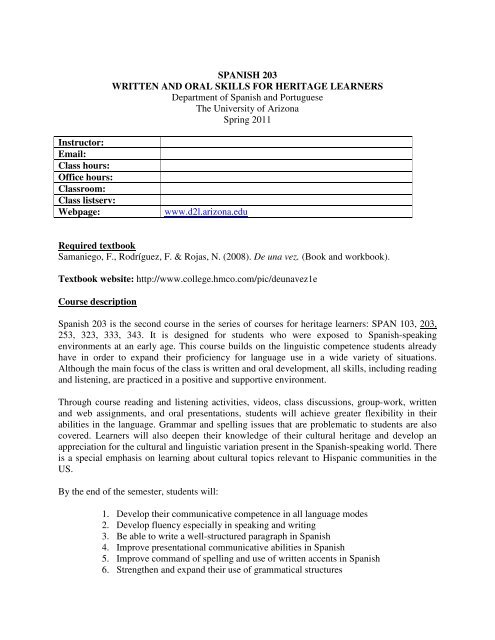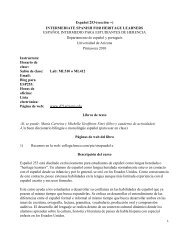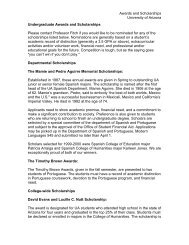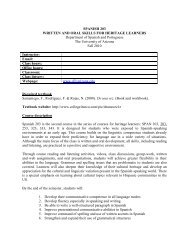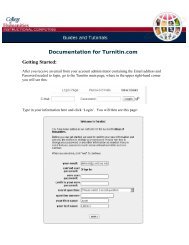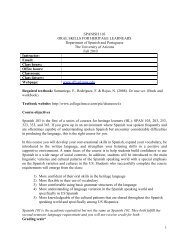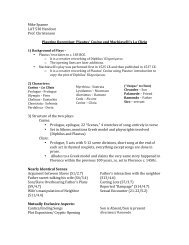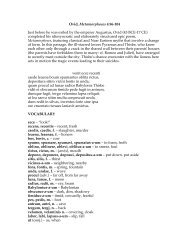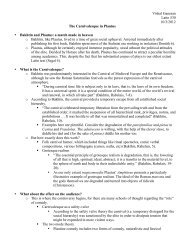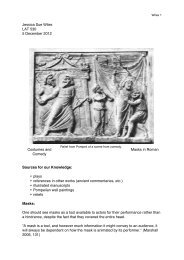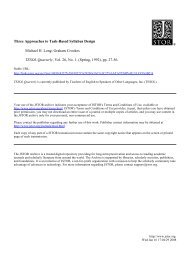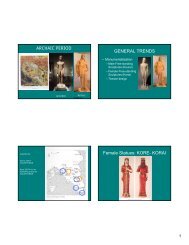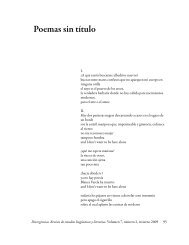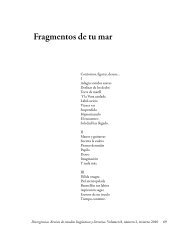Sample syllabus of the course - University of Arizona
Sample syllabus of the course - University of Arizona
Sample syllabus of the course - University of Arizona
Create successful ePaper yourself
Turn your PDF publications into a flip-book with our unique Google optimized e-Paper software.
SPANISH 203<br />
WRITTEN AND ORAL SKILLS FOR HERITAGE LEARNERS<br />
Department <strong>of</strong> Spanish and Portuguese<br />
The <strong>University</strong> <strong>of</strong> <strong>Arizona</strong><br />
Spring 2011<br />
Instructor:<br />
Email:<br />
Class hours:<br />
Office hours:<br />
Classroom:<br />
Class listserv:<br />
Webpage: www.d2l.arizona.edu<br />
Required textbook<br />
Samaniego, F., Rodríguez, F. & Rojas, N. (2008). De una vez. (Book and workbook).<br />
Textbook website: http://www.college.hmco.com/pic/deunavez1e<br />
Course description<br />
Spanish 203 is <strong>the</strong> second <strong>course</strong> in <strong>the</strong> series <strong>of</strong> <strong>course</strong>s for heritage learners: SPAN 103, 203,<br />
253, 323, 333, 343. It is designed for students who were exposed to Spanish-speaking<br />
environments at an early age. This <strong>course</strong> builds on <strong>the</strong> linguistic competence students already<br />
have in order to expand <strong>the</strong>ir pr<strong>of</strong>iciency for language use in a wide variety <strong>of</strong> situations.<br />
Although <strong>the</strong> main focus <strong>of</strong> <strong>the</strong> class is written and oral development, all skills, including reading<br />
and listening, are practiced in a positive and supportive environment.<br />
Through <strong>course</strong> reading and listening activities, videos, class discussions, group-work, written<br />
and web assignments, and oral presentations, students will achieve greater flexibility in <strong>the</strong>ir<br />
abilities in <strong>the</strong> language. Grammar and spelling issues that are problematic to students are also<br />
covered. Learners will also deepen <strong>the</strong>ir knowledge <strong>of</strong> <strong>the</strong>ir cultural heritage and develop an<br />
appreciation for <strong>the</strong> cultural and linguistic variation present in <strong>the</strong> Spanish-speaking world. There<br />
is a special emphasis on learning about cultural topics relevant to Hispanic communities in <strong>the</strong><br />
US.<br />
By <strong>the</strong> end <strong>of</strong> <strong>the</strong> semester, students will:<br />
1. Develop <strong>the</strong>ir communicative competence in all language modes<br />
2. Develop fluency especially in speaking and writing<br />
3. Be able to write a well-structured paragraph in Spanish<br />
4. Improve presentational communicative abilities in Spanish<br />
5. Improve command <strong>of</strong> spelling and use <strong>of</strong> written accents in Spanish<br />
6. Streng<strong>the</strong>n and expand <strong>the</strong>ir use <strong>of</strong> grammatical structures
7. Expand <strong>the</strong>ir lexical repertoire in Spanish<br />
8. Understand <strong>the</strong> nature and extent <strong>of</strong> language and culture variation in <strong>the</strong> Spanishspeaking<br />
world<br />
9. Gain knowledge about <strong>the</strong>ir cultural heritage<br />
10. Appreciate <strong>the</strong> cultural differences among Spanish speakers in Latin America and<br />
in <strong>the</strong> United States<br />
Spanish 203 is <strong>the</strong> academic equivalent but not <strong>the</strong> same as Spanish 202. They both fulfill <strong>the</strong><br />
fourth-semester language requirement and you will not receive credit for both.<br />
Course policies<br />
Emphasis will be on learning Spanish for real world purposes. You and your instructor will<br />
speak Spanish 100% <strong>of</strong> <strong>the</strong> time. There will be pair-work, group activities and whole-class<br />
discussions in which you are expected to actively participate and to use only Spanish. You are<br />
expected to use <strong>the</strong> grammatical concepts and vocabulary focused on in this class and in previous<br />
classes. You are also expected to learn <strong>the</strong> cultural information covered in <strong>the</strong> <strong>course</strong>. You<br />
should be prepared for each class and have completed your homework assignments before you<br />
come to class.<br />
Attendance and absence policies<br />
Students should arrive on time. Three late arrivals or early departures by more than 5 minutes<br />
will equal one unexcused absence. Attendance is mandatory. With <strong>the</strong> exception <strong>of</strong> days<br />
scheduled for tests, quizzes, and compositions, you may miss five (5) classes for any reason,<br />
personal, medical, etc. The sixth (6 th ) absence and every subsequent absence after that will<br />
occasion <strong>the</strong> loss <strong>of</strong> two percentage points <strong>of</strong>f <strong>the</strong> FINAL OVERALL COURSE GRADE. After<br />
a total <strong>of</strong> TEN absences, your instructor will refuse your admittance to <strong>the</strong> class and choose to<br />
administratively drop you. If you fail to attend <strong>the</strong> first two days <strong>of</strong> class without notice, you will<br />
automatically receive a ‘withdraw’. If you stop attending class, it is your responsibility to drop<br />
<strong>the</strong> class and inform your instructor. All holidays or special events observed by organized<br />
religions will be honored for those students who show affiliation with that particular religion. In<br />
addition, absences pre-approved by <strong>the</strong> UA Dean <strong>of</strong> Students (or Dean’s designee) will be<br />
honored.<br />
Grading Scale*<br />
A= 92-100 B= 80-91 C=70-79 D= 60-69 F= 59 or less<br />
*You will receive periodic updates <strong>of</strong> your grade in <strong>the</strong> class through <strong>the</strong> D2L website. Please<br />
meet with your instructor frequently to discuss your progress in <strong>the</strong> <strong>course</strong>.
Grading Components:<br />
Classroom Participation 10%<br />
Classroom Presentations (2) 10%<br />
-Group presentation 5%<br />
-Individual presentation 5%<br />
Homework & quizzes 15%<br />
Online Chats (5) 10%<br />
Portfolio 25%<br />
-Compositions (3) 5% each (15% total)<br />
-Community<br />
1% each (5% total)<br />
project and progress reflections (5)<br />
-Vocabulary and spelling entries .5% each (5% total)<br />
Mid-Term Exams (I and II) 15%<br />
Final Exam 15%<br />
Classroom Participation<br />
Students must complete all assignments and be prepared for class. Daily participation grades are<br />
awarded for individual oral participation in class discussions and in group work. Lack <strong>of</strong><br />
preparation and/or participation or for any absence results in a grade <strong>of</strong> zero (0). Classroom<br />
participation will reflect individual preparation, classroom cooperation during group activities,<br />
and respect for <strong>the</strong> class and <strong>the</strong> instructor. Visiting <strong>the</strong> instructor during <strong>of</strong>fice hours will<br />
contribute to your participation grade. You can consult your doubts, questions, problems, grades,<br />
or simply go to talk and practice your Spanish. Any student who arrives late or leaves early will<br />
lose valuable participation points.<br />
In order to take full advantage <strong>of</strong> your language learning experience, you are expected to use<br />
Spanish outside <strong>the</strong> classroom as frequently as possible. Please find out about local events, club<br />
meetings (Club Latino de <strong>Arizona</strong>), volunteering opportunities, CESL programs, online<br />
opportunities, SHL program events, etc.<br />
Computer lab use<br />
The class will be held in <strong>the</strong> computer lab, ML510 or ML412 once a week (please check <strong>the</strong><br />
class schedule or check <strong>the</strong> D2L site for announcements). Class conduct should be followed in<br />
<strong>the</strong> lab. Visiting websites or engaging in activities not related to class is not allowed. Any student<br />
not adhering to computer lab use rules will be asked to leave and lose participation points for <strong>the</strong><br />
day.<br />
The portfolio is a collection <strong>of</strong> different pieces <strong>of</strong> work done in this class with <strong>the</strong> purpose <strong>of</strong><br />
documenting your progress in Spanish. It should be started <strong>the</strong> first day <strong>of</strong> class and will<br />
continue to grow as <strong>the</strong> semester progresses. Your teacher will ask you to bring <strong>the</strong> portfolio to<br />
class <strong>of</strong>ten so have it ready at all times. It will have 3 sections: 1) reflections on community<br />
projects, 2) vocabulary and spelling entries, 3) 3 compositions.
Reflections on community projects: When announced in <strong>the</strong> <strong>syllabus</strong>, you will have to write<br />
about your experiences regarding a community project assigned by your instructor. The topics<br />
are <strong>the</strong> following:<br />
1. Hispanic music<br />
2. Local traditions, legends, and/or oral histories <strong>of</strong> elderly members <strong>of</strong> <strong>the</strong> HL community:<br />
interviews or surveys<br />
3. Hispanic foods<br />
4. Volunteer Service (Club Latino de AZ, local organizations)<br />
5. My progress in this class<br />
Vocabulary/spelling entries: This gives you an opportunity to record all new words and new<br />
spellings that you discover. Each entry should contain a minimum <strong>of</strong> 5 words and 5 new<br />
spellings. Each word should appear with a definition and an example <strong>of</strong> your own.<br />
Compositions: Students will write three essays, typed and double-spaced using 12-point Times<br />
Roman justified font. The topics will cover different aspects <strong>of</strong> <strong>the</strong> Hispanic cultures and<br />
traditions. All essays will require parts to be written at home and parts to be done in class and in<br />
groups so as to engage in a collaborative construction <strong>of</strong> <strong>the</strong> texts. Up to 10 points will be added<br />
to revised papers submitted within one week after <strong>the</strong> graded writing is returned to <strong>the</strong> student.<br />
The length varies depending on <strong>the</strong> composition so make sure to ask your instructor.<br />
Remember!: During <strong>the</strong> semester, <strong>the</strong> instructor will frequently ask you for <strong>the</strong> portfolio with or<br />
without notice so have it ready.<br />
Classroom Presentations<br />
Students will prepare and participate in two presentations about different aspects <strong>of</strong> <strong>the</strong> class,<br />
each evaluated for comprehensibility, vocabulary, content, accuracy, and creativity. The first<br />
group presentations consist <strong>of</strong> 6-8 minute interactive presentations in groups <strong>of</strong> 2-3 about a<br />
Hispanic country <strong>of</strong> your choice. Individual 6-minute presentations will take place at <strong>the</strong> end <strong>of</strong><br />
<strong>the</strong> semester about <strong>the</strong> topic <strong>of</strong> a composition or reflection.<br />
Online discussions<br />
Out <strong>of</strong> class, students will participate in five chat exchanges in Spanish. You will have <strong>the</strong><br />
opportunity to get to know o<strong>the</strong>r students and discuss interesting and controversial topics with<br />
<strong>the</strong>m. More specific instructions will be provided in class.<br />
Spanish/English language use log<br />
Three times during <strong>the</strong> semester students will have to record how much Spanish and English <strong>the</strong>y<br />
use during one entire day. They will write down <strong>the</strong> topic, <strong>the</strong> context, <strong>the</strong> language, <strong>the</strong> time,<br />
and <strong>the</strong> interlocutors. Students will hand in <strong>the</strong> log toge<strong>the</strong>r with a reflection on <strong>the</strong> use <strong>of</strong> <strong>the</strong>se<br />
two languages and how to achieve a good balance <strong>of</strong> use between <strong>the</strong> two. This will count as part<br />
<strong>of</strong> your daily homework.
Exams<br />
There will be 2 exams during <strong>the</strong> semester. Exam 1 will cover <strong>the</strong> material covered between<br />
weeks 1 and 5, exam 2 will cover weeks 6 through 12. Make-up exams cannot be administered<br />
without a documented excuse <strong>of</strong> an emergency. Students should contact <strong>the</strong> instructor before <strong>the</strong><br />
date <strong>of</strong> <strong>the</strong> exam in case <strong>of</strong> a time conflict. The exam, however, takes top priority so you will<br />
need to cancel any appointment scheduled for <strong>the</strong> days <strong>of</strong> <strong>the</strong> exams. If an emergency happens<br />
<strong>the</strong> day <strong>of</strong> <strong>the</strong> exam, you need to contact <strong>the</strong> instructor or, if unavailable, <strong>the</strong> department<br />
immediately to make <strong>the</strong> necessary arrangements before <strong>the</strong> next class period. Make-up exams<br />
cannot be administered after two days <strong>of</strong> <strong>the</strong>ir initial scheduled date.<br />
Final Exam<br />
The final exam is comprehensive. Students who do not take <strong>the</strong> final exam on <strong>the</strong> scheduled date<br />
and time will receive a grade <strong>of</strong> zero. The Program Director must approve an alternate final<br />
exam in case <strong>of</strong> a medical emergency. No o<strong>the</strong>r excuses will be considered.<br />
Homework<br />
The instructor will assign a homework assignment for every class. This can consist <strong>of</strong> a reading<br />
or writing assignment, a grammar exercise, a web activity, and/or a language use activity such as<br />
participation in chats, club meetings, CESL programs, interviews, etc. No late homework will be<br />
accepted unless <strong>the</strong> student provides a documented excuse. Depending on <strong>the</strong> circumstances, you<br />
may occasionally be allowed to hand in your homework up to one day late but will lose 50% <strong>of</strong><br />
<strong>the</strong> grade for <strong>the</strong> assignment. If you are absent when an assignment is due, you are still<br />
responsible for <strong>the</strong> assignment and can submit it online or through email. If you have restricted<br />
web access, please discuss your situation with your instructor and arrange for a friend to drop in<br />
<strong>the</strong> homework for you.<br />
Quizzes<br />
All (un)announced quizzes will be based on <strong>the</strong> topics taught <strong>the</strong> day before and <strong>the</strong> homework<br />
due that day. Come to class prepared and on time! No quiz may be made up for any reason.<br />
Tutoring<br />
The SHL program <strong>of</strong>fers limited tutoring hours for <strong>the</strong> students in <strong>the</strong> program. A tutor can help<br />
you with all your doubts about different aspects <strong>of</strong> <strong>the</strong> Spanish language including grammar,<br />
vocabulary, and orthography. They can also help you practice your oral and written skills. Ask<br />
your instructor or program director at <strong>the</strong> beginning <strong>of</strong> <strong>the</strong> semester for available hours.<br />
Disruptive behavior<br />
Unless you discuss an emergency situation with your instructor in advance, NO CELL PHONES,<br />
pagers or o<strong>the</strong>r electronic communication devices such as laptops or agendas are to be on or used<br />
during class. They are entirely prohibited during exams. O<strong>the</strong>r disrupting behavior such as
eading <strong>the</strong> newspaper, conversing while somebody is talking, leaving <strong>the</strong> classroom during<br />
class, etc, will not be allowed.<br />
Code <strong>of</strong> Academic Integrity<br />
The instructor and <strong>the</strong> Program Director will initiate an academic integrity case against students<br />
suspected <strong>of</strong> cheating, plagiarizing, or aiding o<strong>the</strong>rs in dishonest academic behavior. Students are<br />
responsible for reading and understanding <strong>the</strong> Code <strong>of</strong> Academic Integrity, please refer to:<br />
http://studpubs.web.arizona.edu/policies/cacaint.htm. Examples <strong>of</strong> academic dishonesty include,<br />
but are not limited to, plagiarism, cheating, and aiding and abetting dishonesty. If <strong>the</strong> instructor<br />
suspects that a Code <strong>of</strong> Academic Violation has occurred, she/he in accordance with <strong>the</strong> Program<br />
Director shall impose any one <strong>of</strong> <strong>the</strong> following or a combination <strong>of</strong> <strong>the</strong> following sanctions: (1)<br />
Loss <strong>of</strong> credit for work involved, (2) Reduction in grade for <strong>the</strong> entire <strong>course</strong>, (3) Failing grade,<br />
(4) Disciplinary probation. For policies against threatening behavior by students, please visit:<br />
http://policy.web.arizona.edu/~policy/threaten.shtml.<br />
Disability<br />
Those students who are registered with <strong>the</strong> Disability Resource Center must submit appropriate<br />
documentation to <strong>the</strong> instructor if <strong>the</strong>y are requesting reasonable accommodations. Please refer<br />
to: http://drc.arizona.edu/teach/<strong>syllabus</strong>-statement.html<br />
The information contained in this <strong>course</strong> <strong>syllabus</strong>, except for grades and <strong>course</strong> policies, may be<br />
subject to change with reasonable advance notice, as deemed appropriate by <strong>the</strong> instructor. The<br />
<strong>syllabus</strong> below is an approximate description <strong>of</strong> <strong>the</strong> <strong>course</strong> content; however, modifications to it<br />
depend largely on students’ interests and <strong>the</strong>ir background knowledge. You are a valuable<br />
resource to <strong>the</strong> classroom and it is expected that you will greatly contribute to class activities<br />
through introduction <strong>of</strong> topics that are relevant for you as a heritage learner and as a member <strong>of</strong> a<br />
Spanish-speaking community.<br />
Horario tentativo<br />
Fechas Capítulos Temas Gramática Ortografía Actividades<br />
Semana 1<br />
(1-12/1-13)<br />
Semana 2<br />
(1-18/1-20)<br />
1-17:<br />
- Capítulo:<br />
¿Qué<br />
significa ser<br />
hispano?<br />
(Entre<br />
Mundos)<br />
- Capítulo:<br />
¡En español,<br />
por favor!<br />
(Conozcámonos)<br />
-Introducción a<br />
la clase y los<br />
estudiantes<br />
-Programa del<br />
curso<br />
-Cómo tener<br />
éxito en esta<br />
clase:<br />
Sugerencias<br />
-Nuestros<br />
valores<br />
-Nuestra cultura<br />
-Mi lengua y mi<br />
identidad: el<br />
español<br />
-Diferencias<br />
-Repaso: 1)<br />
Presente del<br />
indicativo:<br />
Formas y usos<br />
2) ‘ser’ y ‘estar’<br />
-Repaso: 1)<br />
Presente del<br />
indicativo:<br />
Formas y usos<br />
Actividad:<br />
-Escrito de diagnóstico en<br />
clase (notas de clase)<br />
-Entrevista de diagnóstico<br />
oral con el instructor en<br />
horas de <strong>of</strong>icina<br />
-Mi biografía lingüística y<br />
cultural<br />
-Entrevista diagnóstica con<br />
el instructor en horas de<br />
<strong>of</strong>icina<br />
-Actividad de audio-
Martin<br />
Lu<strong>the</strong>r King<br />
Jr. no classes<br />
Semana 3<br />
(1-24/1-27)<br />
Semana 4<br />
(1-31/2-3)<br />
Semana 5<br />
(2-7/2-10)<br />
2-8:<br />
Last day to<br />
drop classes<br />
Semana 6<br />
(2-14/2-17)<br />
Semana 7<br />
(2-21/2-24)<br />
Semana 8<br />
(2-28/3-3)<br />
- Capítulo:<br />
Mi familia<br />
(Conozcámonos)<br />
-Entre<br />
Mundos (p.<br />
30, 31, 32 y<br />
33)<br />
- Capítulo:<br />
Mi familia<br />
(Conozcá-monos)<br />
- Capítulo:<br />
Mi familia<br />
(Conozcá-monos)<br />
-De una vez<br />
(capítulo 7):<br />
Españoles-<br />
La<br />
diversidad<br />
-De una vez<br />
(capítulo<br />
10): Perú<br />
-De una vez<br />
(capítulo<br />
10): Perú<br />
entre registros<br />
(informal/formal;<br />
oral y escrito):<br />
Características<br />
-La importancia<br />
del español y el<br />
inglés<br />
-Los países de<br />
habla hispana<br />
-Diferencias<br />
entre registros<br />
(informal/formal;<br />
oral y escrito):<br />
Características<br />
-Técnicas para<br />
estudiar y<br />
practicar el<br />
español en<br />
preparación para<br />
el examen I<br />
-Tradiciones<br />
diferentes<br />
-Las tradiciones<br />
y la diversidad<br />
lingüística<br />
-Las<br />
comunidades<br />
indígenas<br />
-Los derechos de<br />
las minorías<br />
vs. Presente<br />
progresivo<br />
2) El género<br />
- Repaso: 1)<br />
Pretérito: Verbos<br />
regulares,<br />
irregulares y con<br />
cambio de raíz<br />
- Repaso:<br />
Pretérito e<br />
imperfecto:<br />
Formas y usos<br />
- Repaso:<br />
Pretérito e<br />
imperfecto:<br />
Formas y usos<br />
- Repaso:<br />
Concordancia<br />
entre género y<br />
número<br />
(continuación)<br />
-El presente<br />
perfecto<br />
-Diferencias<br />
entre el<br />
alfabeto<br />
inglés y el<br />
español:<br />
letras<br />
problemáticas<br />
(reflexión) y<br />
deletreos<br />
diferentes<br />
-La sílaba<br />
tónica:<br />
Agudas,<br />
graves y<br />
esdrújulas<br />
-Introducción<br />
a la sílaba<br />
tónica:<br />
Práctica con<br />
las palabras<br />
agudas<br />
-‘ha’ y ‘a’<br />
-El futuro -La sílaba<br />
tónica:<br />
práctica con<br />
las palabras<br />
graves<br />
-El condicional -La sílaba<br />
tónica:<br />
práctica con<br />
las palabras<br />
esdrújulas<br />
-La ‘c’, ‘s, ‘z’<br />
comprensión 1: Mi variedad<br />
-Reflexión 1 (Estilo<br />
informal)<br />
-Actividad de audiocomprensión<br />
2: Estilos<br />
informales<br />
-Reflexión 2 (Estilo<br />
informal)<br />
Actividad:<br />
-Spanish/English language<br />
use log<br />
-Actividad de audiocomprensión<br />
3: Las noticias<br />
(Ejemplo de estilo formal)<br />
-Composición 1<br />
(Preparación: p. 261-262)<br />
(Estilo formal)<br />
-Repaso para el examen:<br />
Guía<br />
-Actividad de audiocomprensión<br />
4: La<br />
telenovela<br />
-Intercambio en el chat I<br />
-Composición I: Entrega y<br />
trabajo de edición en clase<br />
-Repaso para el examen:<br />
Guía<br />
Examen 1<br />
-Intercambio en el chat II<br />
-Película: Quinceañera (en<br />
D2L)<br />
-Reflexión 3<br />
Lab: Webquest<br />
-Actividad de audiocomprensión<br />
5<br />
-Composición 2:<br />
Preparación (p. 378-379)<br />
-Repaso para el examen:<br />
Guía de repaso<br />
Semana 9 Presentaciones grupales orales -Las reglas de -Composición 2: Entrega y
(3-7/3-10) la tilde trabajo de edición en clase<br />
Actividad:<br />
-Spanish/English language<br />
use log<br />
-Encuesta sobre tu opinión<br />
sobre la clase<br />
-Intercambio en el chat III<br />
Semana 10<br />
(3-14/3-17)<br />
Semana 11<br />
(3-21/3-24)<br />
Semana 12<br />
(3-28/3-31)<br />
Semana 13<br />
(4-4/4-7)<br />
Semana 14<br />
(4-11/4-14)<br />
Semana 15<br />
(4-18/4-21)<br />
Semana 16<br />
(4-25/4-28)<br />
Semana 17<br />
(5-2/5-4)<br />
5-4: Last<br />
Day <strong>of</strong><br />
classes<br />
-De una vez (capítulo 8):<br />
México<br />
-La historia sociopolítica de los<br />
mexicano-americanos<br />
-Personalidades transcendentes<br />
-De una vez<br />
(capítulo 8):<br />
México<br />
-De una vez<br />
(capítulo 9):<br />
Guatemala-<br />
-De una vez<br />
(capítulo 9):<br />
Guatemala<br />
-De una vez<br />
(capítulo<br />
12):<br />
Argentina<br />
-De una vez<br />
(capítulo<br />
12):<br />
Argentina<br />
Recursos en la<br />
comunidad y la<br />
web<br />
Recursos en la<br />
comunidad y la<br />
web<br />
-Lenguas en<br />
contacto<br />
-Las variedades<br />
regionales<br />
-El voseo (p.<br />
209)<br />
-El bilingüismo<br />
-Recursos en la<br />
comunidad y la<br />
web<br />
Presentaciones orales<br />
-El bilingüismo<br />
-Recursos en la<br />
comunidad y la<br />
web<br />
-Las variedades<br />
regionales<br />
Spring Recess<br />
No classes Saturday-Sunday, March 12-20, 2011<br />
-El subjuntivo<br />
-El subjuntivo -Las reglas de<br />
la tilde:<br />
Repaso<br />
-Examen # 2<br />
-La ‘b’ y ‘v’ Actividad:<br />
-Spanish/English language<br />
use log<br />
Lab: Webquest<br />
-Intercambio en el chat IV<br />
-El subjuntivo -Intercambio en el chat 9<br />
-El subjuntivo Verbos ‘hacer’<br />
y ‘ser’<br />
-Tema<br />
gramatical<br />
problemático<br />
para los<br />
alumnos<br />
-Tema<br />
ortográfico<br />
problemático<br />
para los<br />
alumnos<br />
Final exam: The date <strong>of</strong> <strong>the</strong> exam is based on <strong>the</strong> day and time <strong>of</strong><br />
class. http://registrar.arizona.edu/schedule111/exams/111exams.htm<br />
(No changes can be made to <strong>the</strong> <strong>of</strong>ficial exam schedule)<br />
-Reflexión 4<br />
-Intercambio en el chat V<br />
-Composición 3<br />
(Preparación: p. 454-455-<br />
456)<br />
-Composición 3: Entrega y<br />
trabajo de edición en clase<br />
-Encuesta sobre la clase y el<br />
programa para estudiantes<br />
de herencia<br />
-Prueba de logros<br />
-Repaso para el examen<br />
final: Guía de repaso<br />
-Actividad:<br />
Spanish/English language<br />
use log<br />
-Entrega del portafolio con<br />
la reflexión 5<br />
*Recuerda formar parte del Club de Heritage Learners: ‘Club latino de <strong>Arizona</strong>’. Para más<br />
información, comunícate con la Pr<strong>of</strong>esora Sara Beaudrie (beaudrie@email.arizona.edu) o visita<br />
nuestra página de web en http://w3.coh.arizona.edu/spanish/heritage/under_heritage.cfm.<br />
*****************************************


